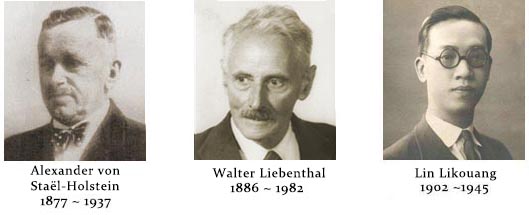- 出 版 物
Publications - 梵文写本
Skt. Manuscripts - 电子资源
Resources - 文史百科
Selected Essays - 音频课程
Audio Lectures - 输 入 法
Skt. Input Method - 梵语宝典
Skt. Manual - 梵佛词典
Fanfo Dictionary

封面 Home | 研究所简介 • About Us | 项目介绍 Project| 专业概况 • Sanskrit Studies at PKU |
Sanskrit Studies at Peking University The inception of Sanskrit Studies at Peking University dates back to 1921, when Alexander von Staël-Holstein delivered a Sanskrit course for students. Walter Liebenthal taught the course in the 1930s after him. They trained a number of Sanskrit students in China, including Lin Likouang and Wu Xiaoling.
In 1946, Dr. Ji Xianlin returned from Göttingen and established the Department of Oriental Languages at Peking University, marking the rooting of the discipline of Indology proper in the soil of modern China. In 1948, Mr. Jin Kemu came to Peking University to join Professor Ji. They worked together to promote Indian studies in China. Thanks to the wide-ranging influence of their effort in teaching and scholarship, this period went through a rapid development of Sanskrit Studies at Peking University. The first undergraduates majoring in Sanskrit and Pali were enrolled in 1960, most of whom pursued an academic career later on. Among them, Mr. Jiang Zhongxin and Mr. Huang Baosheng were celebrated scholars for their scholarly merits in the area. Mr. Jiang was among the first scholars who paid attention to the study of Sanskrit manuscripts in Tibet, and he was also known as the translator of Manusmṛti. Mr. Huang played a vital role in completing the translation of Mahābhārata and also made a major contribution on the study of Sanskrit poetics.
In 1978, shortly after the Cultural Revolution, Professor Ji became the vice president of Peking University and the director of the Institute of South Asian Studies, which was established jointly by Peking University and the Chinese Academy of Social Sciences. From then on, the Sanskrit and Pali program offered not only B.A. degree, but also recruited the M.A. and Ph.D. candidates. During the past decades, it has produced more than 40 Bachelor graduates, 40 Master graduates and 20 Ph.D. graduates. Many of them are playing an important role in the universities or research institutes around China, as well as abroad. Till today, Peking University remains the only institution offering the complete program to students of the field, from undergraduate students to Ph. D. candidates. At present, special programs are also offered for students at Peking University who are not majoring in Indology. As a minor major, courses of Tibetan language and literature are available for them. Besides, seminars for Gāndharī and even Khotanese are regularly organized. The current faculty consists of Boya Chair Professor Dr. Wang Bangwei, Boya Chair Professor Dr. Duan Qing; four Associate Professors, Dr. Gao Hong, Dr. Saerji, Dr. Ye Shaoyong and Dr. Fan Jingjing. Professor Wang is a leading scholar in Buddhist studies and makes a great contribution on the collation and textual criticism of well-known Chinese classic works such as Datang xiyu ji (Great Tang Records of the Western Regions) by Xuanzang and Nanhai jigui neifa zhuan (Records of Buddhism Sent Home from the South Seas) by Yi Jing. Professor Duan is active in several fields and contributes a lot to the studies of Sanskrit grammar, Indic manuscripts and Pali literature. She is also a leading scholar in Khotanese studies. In recent years, works of young faculty members have been gaining high evaluation from the international academic world. |


